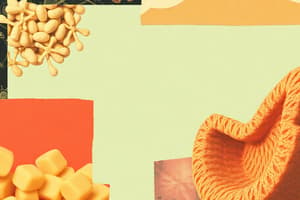Podcast
Questions and Answers
Which enzyme is secreted by bacteria in the digestive system of herbivores to break down cellulose?
Which enzyme is secreted by bacteria in the digestive system of herbivores to break down cellulose?
- Cellulase (correct)
- Protease
- Lactase
- Amylase
What is the function of carbohydrates in arthropods such as insects and crabs?
What is the function of carbohydrates in arthropods such as insects and crabs?
- Structural support and protection (correct)
- Hormone production
- Energy storage only
- Transport of nutrients
What distinguishes chitin from other carbohydrates like cellulose?
What distinguishes chitin from other carbohydrates like cellulose?
- Chitin is solely an energy source
- Chitin is free of nitrogen
- Chitin contains modified sugars with nitrogen (correct)
- Chitin is found only in plants
Which of the following macromolecules primarily serves as an energy source in animals?
Which of the following macromolecules primarily serves as an energy source in animals?
How do herbivores utilize grass that is rich in cellulose?
How do herbivores utilize grass that is rich in cellulose?
What is formed when two monosaccharides undergo a dehydration reaction?
What is formed when two monosaccharides undergo a dehydration reaction?
Which disaccharide is composed of glucose and galactose?
Which disaccharide is composed of glucose and galactose?
Which of the following is NOT a common disaccharide?
Which of the following is NOT a common disaccharide?
What is the primary function of starch in plants?
What is the primary function of starch in plants?
What is the main component of the cell walls of plants?
What is the main component of the cell walls of plants?
What form of glucose storage is unique to animals?
What form of glucose storage is unique to animals?
Which statement about cellulose is true?
Which statement about cellulose is true?
How does cellulose differ from starch in its structure?
How does cellulose differ from starch in its structure?
Flashcards are hidden until you start studying
Study Notes
Disaccharides
- Formed when two monosaccharides undergo a dehydration reaction (water molecule is removed)
- Common disaccharides:
- Lactose: glucose + galactose (found in milk)
- Maltose: glucose + glucose
- Sucrose: glucose + fructose (table sugar)
Polysaccharides
- Long chain of monosaccharides linked by covalent bonds
- May be branched or unbranched
- May contain different types of monosaccharides
- Common polysaccharides:
- Starch: storage form of sugar in plants (amylose and amylopectin, both polymers of glucose)
- Glycogen: storage form of glucose in animals (highly branched, stored in liver and muscle cells)
- Cellulose: structural support in plants (made of glucose monomers linked in a specific way, providing rigidity and tensile strength)
- Chitin: forms the exoskeleton in arthropods (nitrogenous carbohydrate, made of repeating units of modified sugar)
Cellulose Digestion
- Cannot be broken down by human digestive enzymes
- Herbivores possess bacteria in their digestive system that produce cellulase, which breaks down cellulose into glucose
Carbohydrate Functions
- Energy storage: starch and glycogen
- Structural support and protection: cellulose and chitin
Studying That Suits You
Use AI to generate personalized quizzes and flashcards to suit your learning preferences.




